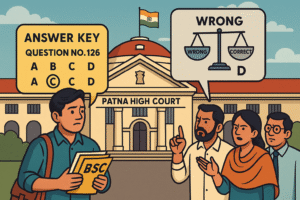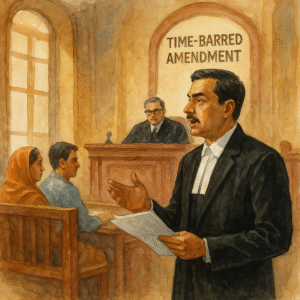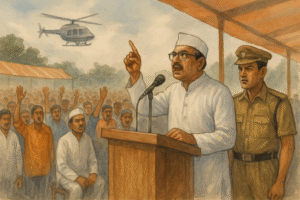Simplified Explanation of the Judgment (Approx. 850 words)
In a 2021 decision, the Patna High Court dismissed two writ petitions challenging the correctness of certain answers in the Bihar Public Service Commission (BPSC) Preliminary Examination. The petitioners, including one from Bihar and others from Uttar Pradesh, alleged that some answers in the BPSC’s published key were wrong and that the Commission had unfairly evaluated their responses.
The petitions (CWJC No. 7429/2021 and CWJC No. 7595/2021) were heard together because they raised identical issues. The Court, comprising Hon’ble Mr. Justice Shivaji Pandey and Hon’ble Mr. Justice Partha Sarthy, ruled that candidates who failed to object to the provisional answer key within the time limit announced by BPSC cannot later challenge the results after publication of the final key.
Background
The BPSC had conducted a competitive examination and published a notice on 19 December 2020 on its official website. This notice displayed the provisional answer key and invited objections from candidates up to 31 December 2020, 5:00 PM. The Commission made it clear that any objections had to be submitted in a sealed envelope, specifying the advertisement number. After considering all objections, an expert committee would finalize the answers and prepare the final key.
However, the petitioners did not raise any objections during the stipulated period. After the final results were declared, they filed writ petitions, claiming that the “correct answer” to certain questions was different from what BPSC had accepted.
- In CWJC No. 7429 of 2021, the grievance related to Question No. 126. The petitioner marked option “C,” but BPSC treated “D” as correct.
- In CWJC No. 7595 of 2021, the dispute was over Question Nos. 46 and 128 of Booklet Series “B.”
The petitioners argued that:
- The procedure for inviting objections was not mentioned in the original advertisement, so BPSC could not alter the process midway.
- There was no statutory provision for inviting objections to a model answer.
- Candidates could not be expected to check the BPSC website daily for such notices.
They relied on an earlier 2014 Patna High Court judgment (CWJC No. 13999 of 2014) that questioned post-exam procedural changes.
Court’s Findings
The Division Bench rejected all arguments of the petitioners.
1. Standardized Procedure Followed:
The Court observed that publishing a provisional answer key and inviting objections is now a standard procedure adopted by almost all examining bodies across India. This process ensures transparency and gives candidates an opportunity to contest potentially incorrect answers before results are finalized.
2. No Objection, No Later Challenge:
Since the petitioners did not raise any objections when the provisional key was published, they lost the right to question it later. Once the final results were announced, candidates could not “take a round” and reopen issues that should have been addressed earlier.
3. Duty of Candidates to Remain Informed:
The Court rejected the plea that candidates cannot be expected to visit the website daily. It said that every serious aspirant is expected to remain aware of official updates, especially when examinations are conducted by reputed institutions like BPSC.
4. Reliance on Earlier Division Bench Judgment:
The Court referred to Ravindra Kumar Singh v. State of Bihar [2016 (1) PLJR 865], where it had clearly laid down that BPSC and similar commissions should:
- Publish a provisional answer key after examinations.
- Invite objections from candidates within a stipulated time.
- Finalize answers through an expert committee after reviewing all objections.
This precedent, which followed Supreme Court principles, made it clear that the procedure adopted by BPSC was valid and fair.
As such, the earlier 2014 single-judge ruling relied on by the petitioners was no longer good law.
5. Result:
Finding no illegality in the BPSC’s conduct or the answer key, the High Court dismissed both writ petitions as meritless.
Significance or Implication of the Judgment
This judgment is significant for competitive examination candidates and public service commissions alike.
- For Candidates:
The decision reinforces that aspirants must remain vigilant and use all opportunities provided to raise objections promptly. Courts will not entertain challenges after results are declared if the candidate ignored the prescribed objection process. - For Examination Bodies:
The Court’s approval of the “provisional key–objection–final key” system confirms that this process is now judicially recognized as transparent, fair, and binding. - For the Public and Government:
It ensures examinations remain credible and prevents administrative paralysis caused by repeated post-result litigation. Transparency mechanisms like model answers and expert review maintain public confidence in recruitment systems.
Legal Issue(s) Decided and the Court’s Decision
- Issue 1: Whether BPSC could adopt a post-exam procedure of publishing provisional answer keys and inviting objections when not mentioned in the advertisement.
Decision: Yes, such practice is a standard, fair, and lawful procedure. - Issue 2: Whether candidates who failed to object within the stipulated time could challenge the final result later.
Decision: No, candidates who did not object earlier cannot raise disputes post-result. - Issue 3: Whether lack of statutory provision invalidates the objection process.
Decision: No. The process is consistent with established judicial directions (Ravindra Kumar Singh, 2016). - Issue 4: Whether BPSC was wrong in evaluating specific questions.
Decision: Not examined on merits since petitioners forfeited their right to challenge by not objecting earlier.
Judgments Referred by Parties
- CWJC No. 13999 of 2014, Patna High Court (Single Judge decision) — cited by petitioners.
Judgments Relied Upon or Cited by Court
- Ravindra Kumar Singh v. State of Bihar, 2016 (1) PLJR 865 — Division Bench ruling endorsing the provisional answer key system.
- Supreme Court rulings affirming procedural fairness in public examinations (cited generally).
Case Title
Petitioners v. State of Bihar & Bihar Public Service Commission (anonymized)
Case Numbers
- Civil Writ Jurisdiction Case No. 7429 of 2021
- Civil Writ Jurisdiction Case No. 7595 of 2021
Citation(s)
2021(2) PLJR 554
Coram and Names of Judges
Hon’ble Mr. Justice Shivaji Pandey
Hon’ble Mr. Justice Partha Sarthy
Names of Advocates and who they appeared for
- For Petitioners (CWJC 7429/2021): Mr. Manoj Kumar & Ms. Aishwarya Shree, Advocates
- For State: Mr. Saroj Kumar Sharma, AC to AAG-3
- For Commission: Mr. Sanjay Pandey & Mr. Nishant Kumar Jha, Advocates
- For Petitioners (CWJC 7595/2021): Mr. Ranjan Kumar Srivastava, Advocate
Link to Judgment
MTUjNzQyOSMyMDIxIzEjTg==-Hy3OJsHymBg=
If you found this explanation helpful and wish to stay informed about how legal developments may affect your rights in Bihar, you may consider following Samvida Law Associates for more updates.








